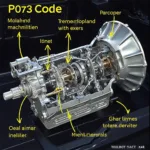The j-1850 obd2 female port is a critical component of the OBD-II diagnostic system, primarily used in Ford vehicles. This port allows communication between a vehicle’s onboard computer and a diagnostic scanner, enabling mechanics and car owners to access vital information about the car’s performance and identify potential issues.
What is a J-1850 OBD2 Female Port?
The j-1850 obd2 female port is a specific type of OBD-II connector utilizing the J-1850 communication protocol. It’s called a “female” port because it receives the “male” connector of the OBD2 scanner. This standard was predominantly employed by Ford, and some other manufacturers, primarily for vehicles manufactured in North America before 2008. Understanding this specific port is crucial for anyone working with older Ford vehicles.
Why is the J-1850 Protocol Important?
The J-1850 protocol was a crucial step in standardizing vehicle diagnostics. While several protocols existed before OBD-II became mandatory, J-1850 helped streamline the process. Two variations of the J-1850 protocol exist: J-1850 PWM (Pulse Width Modulation) and J-1850 VPW (Variable Pulse Width). Ford primarily utilized the PWM version. This protocol allows for a significant amount of data to be transmitted between the vehicle’s computer and the OBD2 scanner, providing detailed information about various systems, including the engine, transmission, and emissions.
How to Locate the J-1850 OBD2 Female Port
Locating the j-1850 obd2 female port in a Ford vehicle is typically straightforward. It’s usually located under the dashboard, often near the steering column or the center console area. The port itself has a characteristic trapezoidal shape. If you’re having trouble finding it, consult your vehicle’s owner’s manual, which should provide a diagram or specific instructions.
Common Problems with the J-1850 OBD2 Female Port
Like any electrical component, the j-1850 obd2 female port can experience issues. Corrosion, bent pins, or loose wiring can all disrupt communication. If your OBD2 scanner isn’t connecting properly, inspect the port for any visible damage. If you suspect a problem with the port itself, it’s best to consult a qualified mechanic.
Choosing the Right OBD2 Scanner for a J-1850 Port
When choosing an OBD2 scanner for a vehicle with a j-1850 obd2 female port, ensure compatibility with the J-1850 protocol, specifically PWM if you’re working with a Ford. Many modern scanners support multiple protocols, including J-1850, CAN, and ISO9141. OBDFree provides comprehensive reviews and comparisons of various OBD2 scanners, helping you select the right tool for your needs.
What Data Can I Access Through the J-1850 OBD2 Female Port?
Using a compatible OBD2 scanner, you can access a wealth of data through the j-1850 obd2 female port. This includes diagnostic trouble codes (DTCs), sensor data (such as engine speed, coolant temperature, and oxygen sensor readings), and freeze frame data (a snapshot of vehicle parameters at the time a fault code was stored). This information is essential for diagnosing and resolving vehicle problems.
Conclusion
The j-1850 obd2 female port plays a vital role in vehicle diagnostics, particularly in older Ford models. Understanding its function and potential issues is key for effective troubleshooting. By utilizing a compatible OBD2 scanner and resources like OBDFree, you can empower yourself to maintain your vehicle and address potential problems promptly and efficiently.
FAQ
- What is the difference between J-1850 PWM and VPW?
- Where can I find a replacement J-1850 OBD2 port?
- Can I use any OBD2 scanner with a J-1850 port?
- How can I fix a damaged J-1850 port?
- What should I do if my OBD2 scanner doesn’t connect to the J-1850 port?
- What is the cost of a typical J-1850 compatible OBD2 scanner?
- Are there any software programs that work specifically with J-1850 data?
Need assistance? Contact us via WhatsApp: +1(641)206-8880, Email: cardiagtechworkshop@gmail.com or visit our office at 789 Elm Street, San Francisco, CA 94102, USA. We offer 24/7 customer support.

